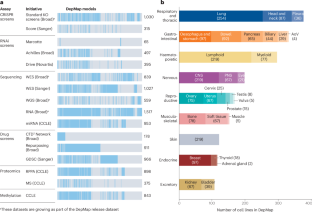癌症依赖地图的现状与未来
IF 72.5
1区 医学
Q1 ONCOLOGY
引用次数: 0
摘要
尽管在过去十年中取得了巨大进步,但癌症的复杂性和异质性使确定新疗法和治疗组合的工作变得更加复杂,而这些新疗法和治疗组合能使大多数患者获得持久的疗效。癌症治疗的进一步发展将部分依赖于开发与癌症遗传和分子特征相匹配的靶向治疗药物。癌症依赖性图谱(DepMap)是一个大型数据存储库和研究平台,旨在系统地揭示数千个基因和分子注释癌症模型中的癌症脆弱性。癌症研究人员和转化科学家经常使用 DepMap,它帮助确定了多种癌症类型的新型选择性治疗策略,这些策略正在临床上进行测试。然而,目前版本的DepMap显然还不够全面。在本视角中,我们将回顾:(1)DepMap的影响和当前用途;(2)增强DepMap以克服其当前局限性的机会;(3)进一步改进和扩展DepMap的持续努力。本文章由计算机程序翻译,如有差异,请以英文原文为准。


The present and future of the Cancer Dependency Map
Despite tremendous progress in the past decade, the complex and heterogeneous nature of cancer complicates efforts to identify new therapies and therapeutic combinations that achieve durable responses in most patients. Further advances in cancer therapy will rely, in part, on the development of targeted therapeutics matched with the genetic and molecular characteristics of cancer. The Cancer Dependency Map (DepMap) is a large-scale data repository and research platform, aiming to systematically reveal the landscape of cancer vulnerabilities in thousands of genetically and molecularly annotated cancer models. DepMap is used routinely by cancer researchers and translational scientists and has facilitated the identification of several novel and selective therapeutic strategies for multiple cancer types that are being tested in the clinic. However, it is also clear that the current version of DepMap is not yet comprehensive. In this Perspective, we review (1) the impact and current uses of DepMap, (2) the opportunities to enhance DepMap to overcome its current limitations, and (3) the ongoing efforts to further improve and expand DepMap. The Cancer Dependency Map (DepMap) is a data repository and research platform that can be utilized to systematically identify cancer vulnerabilities. Here Arafeh, Shibue et al. outline the current limitations and future strategies to enhance the DepMap project.
求助全文
通过发布文献求助,成功后即可免费获取论文全文。
去求助
来源期刊

Nature Reviews Cancer
医学-肿瘤学
CiteScore
111.90
自引率
0.40%
发文量
97
审稿时长
6-12 weeks
期刊介绍:
Nature Reviews Cancer, a part of the Nature Reviews portfolio of journals, aims to be the premier source of reviews and commentaries for the scientific communities it serves. The correct abbreviation for abstracting and indexing purposes is Nat. Rev. Cancer. The international standard serial numbers (ISSN) for Nature Reviews Cancer are 1474-175X (print) and 1474-1768 (online). Unlike other journals, Nature Reviews Cancer does not have an external editorial board. Instead, all editorial decisions are made by a team of full-time professional editors who are PhD-level scientists. The journal publishes Research Highlights, Comments, Reviews, and Perspectives relevant to cancer researchers, ensuring that the articles reach the widest possible audience due to their broad scope.
 求助内容:
求助内容: 应助结果提醒方式:
应助结果提醒方式:


